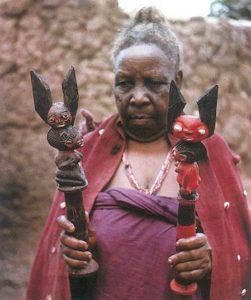
Shango dancer
On this date, from 1800, we celebrate the Shango religion, one of many African-inspired religions practiced in the Americas.
Practiced primarily in Trinidad, Grenada, and Recife (Brazil), where it is known as Xango, it was developed in the 19th century. Shango was brought from Africa during the Middle Passage—the deity, orisha, whose power is represented by the images of thunder and lightning. As the legendary fourth king of the ancient kingdom of Oyo, Shango's rule was marked by whimsical use of power. One account asserts that Shango was fascinated with magical powers. He inadvertently caused a thunderstorm, and lightning struck his palace, killing many of his wives and children.
In repentance, he left his kingdom and traveled to Koso, where he hung himself. When his enemies cast contempt upon his name, a rash of storms destroyed parts of Oyo. Shango's followers proclaimed him a god and said the storms were Shango's wrath, avenging his enemies. All of the stories concerning Shango represent the themes of capricious, authoritative, creative, destructive, magical, medicinal, and moral power. Shango's staff visualizes the unpredictable and violent power of the divine being. This power is personified through dance. The practice is part of the Yoruba people's history.
The religious worship centers on the Chapelle, a small cult house, and the Palais, a tent where ceremonies and healing occur. Each year, the Palais is the scene of a major festival for Shango that ranges from reciting the Lord's prayer to manifestations of Shango’s spirit and animal sacrifices. At the festival, an entranced devotee, the elegunshango, dances to the sharp staccato rhythms of the bata drum and waves the staff, Oshe, with violent and threatening gestures--and then suddenly draws it to himself in a motion of quiet serenity. In one account regarding the Oshe Shango, the female figure who balances the ax, the sign of Shango's power, is equated with the "caprice and creative experience of human sexuality."
Shango's power is compared to the libidinal drive, which may prove dangerous to the possibilities of creative sexual relationships. This interpretation may reinforce racial stereotypes of African male sexual prowess. Perhaps the Shango cult may instead be viewed as a warning of political leadership's arrogant use of military power.
The African American Desk Reference
Schomburg Center for Research in Black Culture
Copyright 1999 The Stonesong Press Inc. and
The New York Public Library, John Wiley & Sons, Inc. Pub.
ISBN 0-471-23924-0